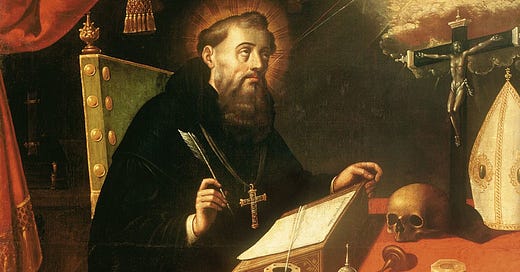Atlanta’s Legacy Theatre put on a series of performances of the musical “Pelagius” this past weekend. The musical, which explores the spiritual journeys of both St. Augustine and his theological opponent Pelagius, concluding with their eventual clash of ideas, was written by Mark Smith (who, along with his wife Bethany, owns the theater) and is based on the songs of Christian musical artist Michael Gungor. The dispute between Augustine and the Pelagians (i.e., Pelagius and his followers) revolved around the extent to which sin has wounded us and, in turn, the extent of our dependence on God’s healing grace for our salvation. The musical apparently attempts to be fair to both sides in the debate, although it takes some liberties with Pelagius’s biography, since we know so little about his life (For example, “Smith created a backstory [for Pelagius] of a Celtic, Druidic lineage. His mother and sister, whom Smith envisions as priestesses, provide inspiration for Pelagius’ teaching on the divine feminine.”)
St. Augustine was unofficially my confirmation saint—I say unofficially because when I joined the Catholic Church, I didn’t go through my parish’s regular RCIA program, and so when it was time for the Easter Vigil, all the other confirmands had slips of paper with the name of their saints written on them to give to the priest. I didn’t have one, though, and so the RCIA director just made a makeshift slip and wrote “St. Matthew” on it without telling me. I chose St. Augustine, though, because one of the things that led me to the Catholic Church was reading his Confessions for a class on the History of Christianity during my first year of college. His account of wrestling with both theological ideas and his own personal weaknesses and finally arriving at faith resonated with me, as it has for numerous converts over the centuries.
Today is Augustine’s feast day, and even though he is my (unofficial) confirmation saint, I usually let the day slip by without remembering its significance until it’s too late. This year, however, I remembered, and although I don’t have it in me to write a musical in his honor, I thought I should write an article to mark the occasion.
Only a couple of weeks ago I wrote about Augustine’s refutation of astrology, particularly the idea that the stars control our destiny, in Book 5 of his City of God. Immediately afterwards, in the same book, he takes on the more vexing question of how we can affirm both that God has foreknowledge of our actions and that we have free will. This was not the first time Augustine had addressed this problem, however; in his much earlier On Free Choice of the Will, he takes up this same question with his dialogue partner Evodius. I’ll return to City of God later, but first let’s explore how he treats the issue in the earlier work.
In Book 3 of On Free Choice of the Will, Evodius raises the question of divine foreknowledge in a particular way: “I very much wonder how God can have foreknowledge of everything in the future, and yet we do not sin by necessity.” Evodius’s manner of posing the question reflects the primary topic of the treatise, the origins of evil. The opening line of the work, Evodius’s question, “Please tell me: isn’t God the cause of evil?”, reveals that one of the concerns of their dialogue is to demonstrate how God, who is good, is not responsible for evil. In Book 1, Augustine and Evodius conclude that the source of evil is not God, but rather the free will of created beings. Although not mentioned in the book, On Free Choice of the Will is clearly a polemic against the Manichees, the religious group to which Augustine formerly belonged which claimed that evil (which they identified with matter and the body) is the creation of an evil god, who is rivals with a good god of spirit.
In Book 3, then, Evodius is concerned that if God knows future events before they occur, that must mean they will necessarily occur. And if our future sinful acts occur out of necessity, then that would seem to suggest that they are not in fact caused by our free will and that God is ultimately responsible for our sin, since God created and set in motion the cosmos in which these necessary sins occur.
Keep reading with a 7-day free trial
Subscribe to Window Light to keep reading this post and get 7 days of free access to the full post archives.




